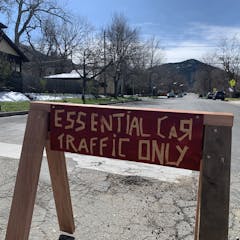
Articles on Sustainable cities
Displaying 41 - 60 of 89 articles

Motorways were once seen as a way of reducing congestion in our towns and cities. But the more we build, the more they fill with drivers.

Nurturing enthusiasm for growing food closer to home could benefit people, wildlife and the global food system.

Fewer weekly commutes means many will be willing to commute further. The effects on urban growth of working from home pose serious challenges.

If more people work from home and shop online, many commercial buildings won’t be needed any longer. What will be needed is affordable housing, and these buildings can be converted to meet this need.

Investing more in cycling and walking would boost both physical and economic health, with a typical return of $5 for every $1 spent on cycling infrastructure.

City streets were built to accommodate cars, but the COVID-19 pandemic has scrambled our transport needs. Many cities are moving to make streets more people-friendly and less car-centric.

A high-speed rail network in Australia would create many benefits by reshaping cities and regional communities along its route.

Research shows that millennials don’t drive as much as previous generations, largely because of their beliefs.

How to trigger eco-innovations after COVID-19.

Turning food scraps and yard trimmings into compost improves soil, making it easier for people to grow their own food. City composting programs spread those benefits more widely.

The release of a roadmap for green roofs, walls and facades in Australia can help our cities catch up with the world leaders in urban greening.

Net zero energy buildings produce at least as much energy as they use. Designing whole net zero campuses and communities takes the energy and climate benefits to a higher level.

A gardening supply shortage during the pandemic showed our ill-preparedness to grow our own food. Permanent backyard veggie gardens can help us survive the next crisis, and provide everyday benefits.

Some new habits we’ve seen emerging during the pandemic could help us solve tricky problems like traffic congestion, which have challenged our cities for a long time.

Frederick Law Olmsted, the designer of many great North American city parks, understood that ready access to nature made cities healthier places to live.

As lockdowns ease off, there is a danger that the old city traffic jams will soon be back with a vengeance.

Recent extreme events in Australia, with torrential rain and floods following devastating bushfires, have focused the World Urban Forum’s attention on the urgency of climate action.

Residents of the ‘leafy suburbs’ will continue to fear what they might lose to increasing urban density without an explicit planning approach that enhances green space in affected neighbourhoods.

The demands on land and resources from our fast-growing cities are unsustainable, as are the wastes they produce. Yet still our leaders act as if unlimited growth is possible.

Ecological economics focuses on sustainability and development rather than efficiency and growth. Cities, as home to 70-80% of economic activity, are at the heart of the challenge of being sustainable.
